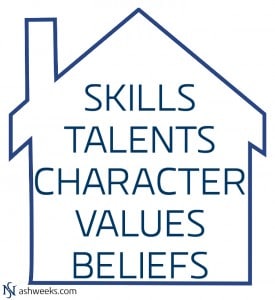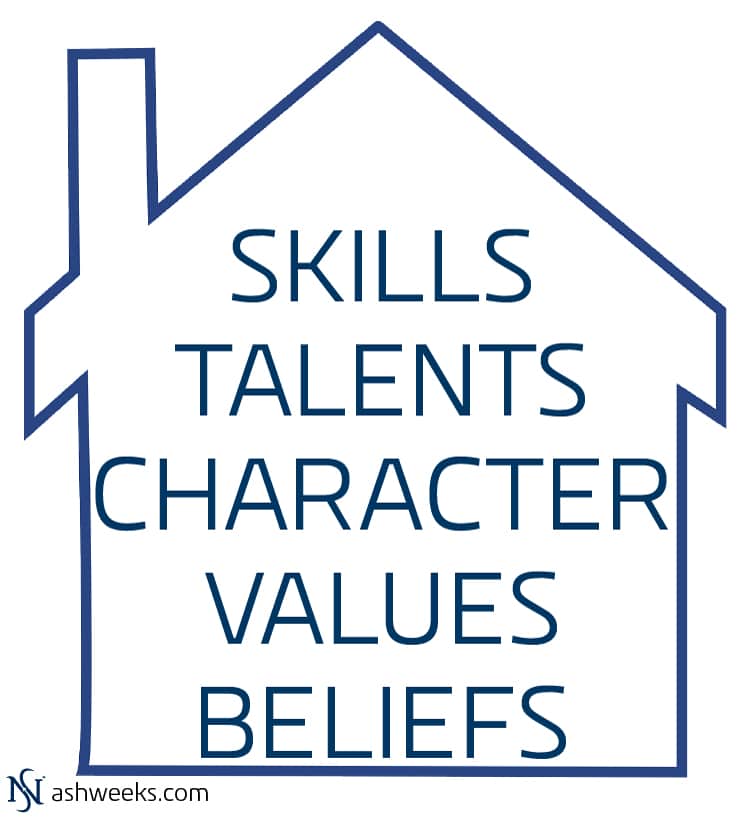What is the meaning of life? What is your purpose? Why are you here? Are you here for a reason? Is there a divine entity looking down on you? What happens after you die?
The way you answer these questions determines the overall context for everything you do in life. It is not often that people sit down and seriously consider these questions but I’m here to tell you that it’s worth putting in the time and effort to figure it out, and I will tell you how I have gone about it.
This is part four of a seven-part series on how to find purpose and direction in your life:
Part 1: Why It’s Worth Knowing
Part 2: Overview
Part 3: Know Yourself
Part 4: Build Strong Foundations
Part 5: How Should We Live?
Part 6: Why Purpose Doesn’t Interest You yet (and When It Will)
Part 7: Discovery
Build Strong Foundations
One of the first talks we received at the 2014 National Student Leadership Forum (NSLF) was on  what it means to be a leader. After a definition of leadership, we were told of the “layers” of leadership: Beliefs, Values, Character, Talents, and Skills. Those layers affected the kind of actions you would take and therefore what kind of leader you would be. They are layers because there is a hierarchy to them: at the bottom you have your beliefs that affect your values, and your values affect the upper layers; at the top you have the skills you have developed over time, and your talents are your predispositions towards certain activities and your innate abilities — these affect the skills you choose to spend time developing; lastly, character is in the centre — it is built over time by the development of certain skills and is affected by the values you live by. Character is what an honest person would describe you as when you’re not listening; the things that describe you and make you distinct.
what it means to be a leader. After a definition of leadership, we were told of the “layers” of leadership: Beliefs, Values, Character, Talents, and Skills. Those layers affected the kind of actions you would take and therefore what kind of leader you would be. They are layers because there is a hierarchy to them: at the bottom you have your beliefs that affect your values, and your values affect the upper layers; at the top you have the skills you have developed over time, and your talents are your predispositions towards certain activities and your innate abilities — these affect the skills you choose to spend time developing; lastly, character is in the centre — it is built over time by the development of certain skills and is affected by the values you live by. Character is what an honest person would describe you as when you’re not listening; the things that describe you and make you distinct.
Part of truly knowing yourself involves assessing your beliefs, your values, and what an accurate description of your character would be. However, the focus of this post is on building a strong foundation of beliefs and values, as these will have a large impact on how you identify yourself and your outlook on life.
A friend of mine likened the layers of leadership to a house. He told me that you can skip the assessment of your beliefs and values and build your house without a foundation. It would be quicker and you could make progress in the direction you had already chosen in life, however, if the time came when something happened to you or you became aware of something that questioned your beliefs about the world and what you valued, then your house would come crashing down. You would feel lost, confused, possibly angry if you had spent many years going down your original path in life and you had realised there was a better path you should have taken instead.
Your house could always be rebuilt, but it’s better to get it right from the beginning.
Accurate Beliefs
When it comes to the world and life itself, what do you believe? More importantly, why do you believe it? Having accurate beliefs about reality allow you to make better decisions because you are better able to model the world and anticipate consequences of actions. For example, science’s progress has enabled flight, it has enabled us to know what actions to take when someone gets sick, and it has enabled me to type this sentence on my laptop. Without this accumulation of knowledge of how the world operates, none of these things would have been possible. Perhaps we would still be in the ages when we sacrificed animals to supernatural beings to protect ourselves from drought or natural disasters.
Some beliefs you might want to question are: Is there a God/s? Is there any other supernatural force operating in the world? What happens when you die? Is there an afterlife of some sort? Is there a divine purpose for all humans? Let’s address the main question of those.
Do you believe in supernatural beings, like a God? If so, why? Likely, you were brought up in a religious family, probably went to a religious school, and possibly had religious friends. All of these people would have spoken of such supernatural beings existing, but since when is hearing someone say something a good reason to believe what they said? Sure, the people who told you might have been trustworthy people in and of themselves, but it’s not the person you need to trust — it’s the source of the information.
For example, let’s say your best friend John, an honest and loyal person, tells you that your mutual friend Zach was in a fight with another person. Do you believe John? It depends. How thorough is he in determining the accuracy and reliability of information? If you aren’t sure, you could ask him why he thinks Zach was in a fight. John could say he heard it from another friend, Steve. Now you have to factor in Steve’s attentiveness or accuracy and reliability of information. Perhaps Steve just saw a big bruise on Zach’s face and came to the conclusion that he was punched, and that the punch was from a fight. Perhaps Zach just got hit by a stray cricket ball while at cricket practice the day before.
If you asked one of those religious people in your life why they believe in God, they might say it’s because they were told by someone else. In the paragraph above, you can see that believing them is not so easy. Perhaps they say they believe because of the Bible (if they’re Christian). Without pointing out all of the inconsistencies in the Bible, let’s just compare the accuracy of the words in the Bible to the words in something you read online. They’re still just words. Unless you saw God write those words, they aren’t evidence. So how do you determine the accuracy of statements?
Evidence
Knowledge requires belief but a belief is only knowledge if it is both true and justified. Truth and justification are independent conditions: the fact that a belief is true does not tell us whether or not it is justified; that depends on how the belief was arrived at.
So how you arrive at a particular belief is crucial. Without getting too technical, sound reasoning and solid evidence seem to be the way to acquire knowledge. Evidence is something that can be observed in objective reality. If you have a question that needs answering, the scientific method says to make observations and do experiments.
The experiment should be repeatable. If you are relying on evidence for a belief where that evidence is the result of an action or experiment, you should be able to replicate that experiment and get the same result.
So, back to the question of God. What evidence is there that a God exists? What logical reasoning allows you to believe in one?
This requirement of sound reasoning and solid evidence applies to everything in your life. The more significant the belief is, the stronger the reasoning and evidence you want to apply to it. For example, the belief in a God can change your entire outlook on life: how you should act, what you think, your actions regarding death. This is significant and should be questioned harshly. In contrast, the belief that Zach (in our story above) got into a fight might not really be that important to us. We might be content with what John told us until we heard contradictory evidence — the effort required to seek evidence might outweigh the benefit in actually knowing.
Making Beliefs Pay Rent
If the above somehow results in you holding a false belief consider whether or not your belief pays rent, as Eliezer Yudkowsky explains it. “Every question of belief should flow from a question of anticipation, and that question of anticipation should be the centre of the inquiry”. In essence, look at your belief and ask what you anticipate as a result of this belief. Do you believe that your prayers affect the outcomes of events in your life? If so, this should have been moved to the ‘false belief’ bin in your mind after the above paragraph — you can look at studies (or perform your own) on whether or not praying affects the outcome of an event. If you failed to remove that belief, then ask yourself: If you prayed for a particular outcome tonight, what would the result be? For example, if you prayed for good weather for all of next week, would you get it? Would you put money on it?
Read Yudkowsky’s post if this explanation isn’t sufficient. This post is beginning to be too long already.
Congruence of Actions and Beliefs
Lastly, I want to point out that what people say they believe is often not what they actually believe.
Steve Pavlina, in his series on purpose, pointed out:
On Monday as I walked around the Las Vegas Strip, I saw a downtrodden homeless man sitting on one of the overhead walkways asking for money. As over a hundred people passed by him each minute, no one even stopped to give him a kind word or a smile. I thought to myself, “Where are all the Christians?” If Jesus is the model for Christian behaviour, what would Jesus do in that situation? What would other role models do? What would you do?
By their words I hear that most Americans are Christian. By their actions I see that most aren’t.
If you say you believe something but don’t act as if you believe it, then you aren’t living congruently — you aren’t being true to yourself. You are in conflict, and others might call you a hypocrite or liar. You either have to change your actions to fit your beliefs or change your beliefs to fit your actions. I suggest you use this purpose-searching series to build a strong foundation for yourself. Invest the time into discovering the truth of your beliefs — which ones to throw out and which ones to keep. You don’t want to build a life on a weak foundation and have your house collapsing on you in the future.
Values
Although your values are influenced by your beliefs, you can analyse these without having previously done a full review of your beliefs of the world. What ways of living are important to you? For example, do you value intelligence, courage, ambition, or loyalty?
You will have discovered some of the things you value when you analysed your actions and motives and dug down to the fundamental reasons why you do things. However, there are other ways to identify your values.
Think of someone you admire, someone you respect, and two or three of your closest friends. Why do you admire them? Why do you respect them? What about them makes them so likeable that you spend more of your social time with these people than others? What qualities and traits? Write them down and be comprehensive in your lists so you don’t miss anything.
Are there other qualities that you feel make up the ideal person? Think of other people you know and if there is a positive quality that draws them to your attention, add that in. Perhaps they are honest, trustworthy, funny, skilled, selfless, dedicated, hardworking, determined, attractive, creative, deep, carefree, or loving.
Your list should highlight the things that matter to you in a person. Some qualities and traits will be more important than others, so I encourage you to put them in rough order of importance as this will be of more use to you.
Life CV
Now it’s time to summarise your efforts so far in understanding yourself.
Your job CV is a single piece of paper that highlights the important aspects of the employee/job part of your life: your name, education, work experience, leadership positions, achievements, relevant hobbies, professional skills, and personal skills. Now expand the context from ’employee/job’ to ‘life’.
You could have a section that summarises your beliefs about the world, a section for your most important values, a section that summarises the influential parts of your history, a list of your talents and skills, your name, gender, sexuality, age — everything you feel encompasses the essence of your identity. Try to get it all onto a single page so that, if someone were to read it, they would understand who you are, what you have been through, your perspective of the world, and what is important to you in life.
If you struggled to find overarching patterns or values that you feel are very important to you, try searching the times you felt a strong emotion. Was there a time when you felt helpless to change your own position, or where you were an onlooker helpless to help another victim? Were you watching a movie or reading a book and you felt angry or sad? Was there a time when you were doing something that was so fun and exciting that you wanted more of it in your life? Is there something about the world that you want to change? A topic you would love to learn more about if only you had the time?
Take note of what the feelings were directed towards. What event, action, or topic? If these values aren’t in your Life CV already, add them in. This exercise in itself might highlight to you something you are passionate about and would like to pursue in the future.
How might you classify yourself with existing labels? Are you a minimalist, atheist, transhumanist, secularist, entrepreneur, philanthropist, employee, athlete, son/daughter, boyfriend/girlfriend, friend, etc?
This is going to be the main material you use to come to terms with your purpose/direction in life.
This is part four of a seven-part series on how to find purpose and direction in your life:
Part 1: Why It’s Worth Knowing
Part 2: Overview
Part 3: Know Yourself
Part 4: Build Strong Foundations
Part 5: How Should We Live?
Part 6: Why Purpose Doesn’t Interest You yet (and When It Will)
Part 7: Discovery





